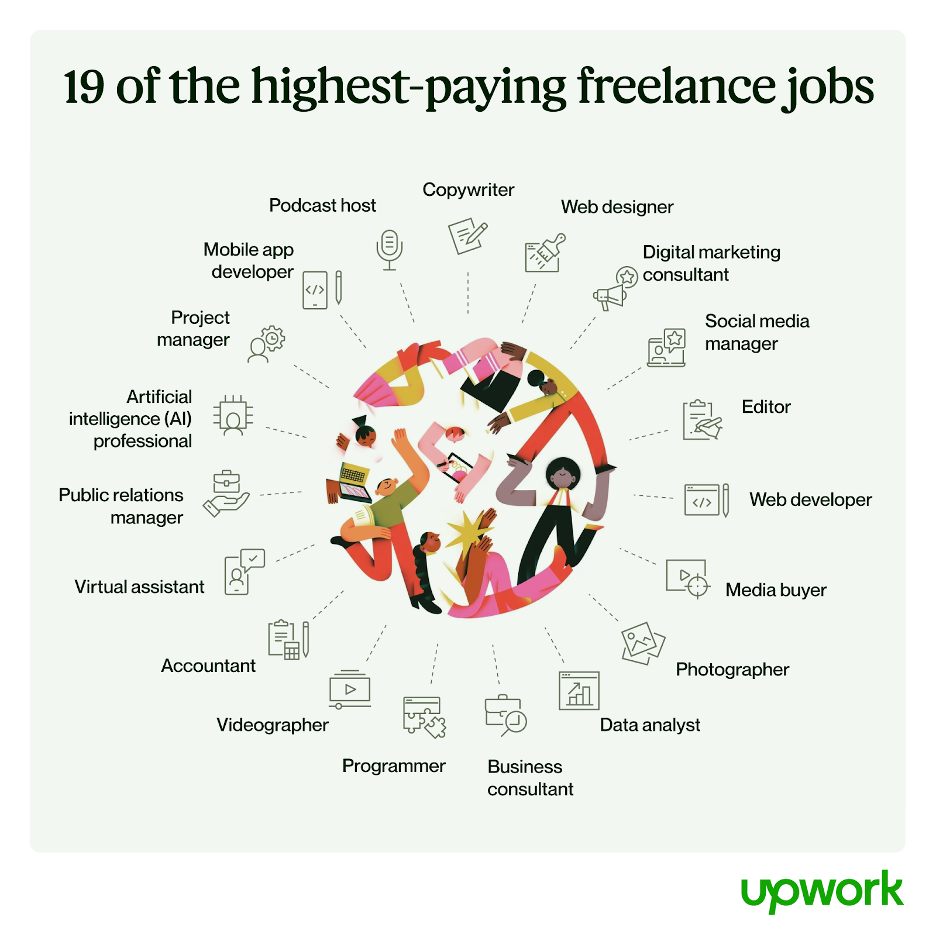The Freelancer's Playbook: Step-by-Step Guide to a Successful Freelance Career
 Manvendra Singh
Manvendra Singh
Introduction
The Rise of Freelancing: A New Era of Work
The modern workforce is undergoing a seismic shift. Traditional employment, with its rigid hours and confined office spaces, is no longer the only viable option. Freelancing, once considered a fallback or a temporary stopgap, has burgeoned into a robust and respected career path. This transformation is driven by technological advancements, evolving work cultures, and a growing desire for flexibility.
The Changing Landscape of Employment
Today's employment landscape is dynamic. Remote work technology has dissolved geographical barriers, allowing professionals to offer their services globally. Companies now value skills over physical presence, favoring a model where efficiency and results take precedence over the traditional 9-to-5.
Why Freelancing is Gaining Popularity
Freelancing is appealing because it aligns with the values of modern professionals: autonomy, creativity, and control. The ability to choose projects, set your own rates, and work from any location is immensely attractive. Moreover, the gig economy is expanding, offering more opportunities than ever before.
Benefits of a Freelance Career
Freelancing isn't just a job; it's a lifestyle. The perks go beyond the obvious financial rewards and touch on personal growth and satisfaction.
Flexibility and Freedom
One of the primary draws of freelancing is the unparalleled flexibility it offers. You can design your workday to suit your lifestyle, allowing for a better work-life balance. Whether you're a night owl or an early bird, you can tailor your schedule to optimize productivity.
Potential for Higher Earnings
Freelancers often have the potential to earn more than their traditionally employed counterparts. By eliminating the middleman, you can command higher rates for your services. Additionally, the ability to take on multiple clients and projects can significantly boost your income.
Diverse Work Opportunities
Freelancing exposes you to a variety of projects and industries. This diversity not only keeps work interesting but also broadens your skill set and professional network, enhancing your career prospects.
Getting Started with Freelancing
Self-Assessment: Is Freelancing Right for You?
Before diving into freelancing, it's essential to evaluate whether this career path suits your personality, skills, and professional goals.
Evaluating Your Skills and Strengths
Assess your competencies and identify the skills that set you apart. Consider how these skills can be applied to a freelance career. Are you a talented writer, designer, or developer? Understanding your strengths will help you choose the right niche.

Choosing Your Freelance Niche
Selecting a niche allows you to focus your efforts and become an expert in a specific field, making it easier to attract clients.
Identifying Market Needs
Research market trends to identify high-demand services. Look for gaps where your skills can provide value. Understanding what clients need helps position you as a valuable solution provider.
Leveraging Your Expertise
Your niche should align with your expertise and interests. Leverage your existing knowledge to build credibility and attract clients who need your specialized skills.
Building a Strong Personal Brand
A compelling personal brand distinguishes you from competitors and attracts clients who resonate with your values and professionalism.
Crafting a Professional Image
Develop a cohesive brand identity, including a logo, color scheme, and professional headshots. Consistency across all platforms reinforces your brand.
Creating a Compelling Portfolio
Showcase your best work in an online portfolio. Include case studies and testimonials to demonstrate your expertise and the value you've delivered to previous clients.
Setting Up Your Freelance Business
Properly establishing your business ensures you're prepared for long-term success.
Legal Considerations and Business Structure
Decide on the appropriate business structure, such as sole proprietorship, LLC, or corporation. Register your business, obtain necessary licenses, and understand your tax obligations.
Essential Tools and Resources
Equip yourself with the right tools, from project management software to accounting systems. These resources streamline operations and enhance productivity.
Finding and Securing Clients
Building an Effective Online Presence
A strong online presence attracts clients and establishes your credibility.
Designing a Professional Website
Create a website that highlights your services, showcases your portfolio, and includes client testimonials. Ensure it's easy to navigate and visually appealing.
Optimizing Your LinkedIn Profile
LinkedIn is a powerful platform for networking and finding clients. Optimize your profile with a professional photo, detailed experience, and endorsements from past clients.
Networking Strategies for Freelancers
Networking expands your reach and opens doors to new opportunities.
Leveraging Social Media
Use social media platforms to share your work, engage with potential clients, and build a community around your brand. Consistent, valuable content positions you as an industry expert.
Attending Industry Events
Attend conferences, workshops, and meetups to connect with industry peers and potential clients. Networking in person can lead to meaningful relationships and opportunities.
Crafting Winning Proposals
A well-crafted proposal convinces clients that you're the best fit for their project.
Understanding Client Needs
Thoroughly research each client and their project. Tailor your proposal to address their specific needs and demonstrate how you can provide value.
Highlighting Your Value Proposition
Clearly articulate what sets you apart from competitors. Highlight your unique skills, experience, and the benefits clients can expect from working with you.
Platforms and Job Boards for Freelancers
Freelance platforms can be a great source of new clients and projects.
Popular Freelance Marketplaces
Explore platforms like Upwork, Freelancer, and Fiverr. These sites connect freelancers with clients looking for various services, offering a steady stream of potential work.
Tips for Standing Out
Optimize your profile, gather positive reviews, and consistently deliver high-quality work. Building a strong reputation on these platforms can lead to more opportunities.
Managing Your Freelance Projects
Effective Client Communication
Clear communication is vital to maintaining client satisfaction and ensuring project success.
Setting Clear Expectations
From the outset, establish project timelines, deliverables, and communication protocols. Clear expectations prevent misunderstandings and ensure smooth project execution.
Building Strong Relationships
Maintain regular contact with clients, providing updates and seeking feedback. Strong relationships foster trust and can lead to repeat business and referrals.
Time Management Techniques
Efficient time management is crucial to balancing multiple projects and meeting deadlines.
Prioritizing Tasks and Deadlines
Use techniques like the Eisenhower Matrix to prioritize tasks based on urgency and importance. Setting deadlines for each task helps maintain momentum.
Using Productivity Tools
Tools like Trello, Asana, and Toggl can help you organize tasks, track time, and stay focused. Find the tools that work best for your workflow and integrate them into your routine.
Financial Management for Freelancers
Sound financial management ensures stability and growth for your freelance business.
Budgeting and Expense Tracking
Create a budget to manage income and expenses. Use tools like QuickBooks or FreshBooks to track expenses, monitor cash flow, and prepare for tax season.
Invoicing and Payment Methods
Implement a reliable invoicing system and set clear payment terms. Tools like PayPal, Stripe, and Square can facilitate timely and secure payments.
Growing Your Freelance Career
Enhancing Your Skills and Knowledge
Continual learning keeps you competitive and opens up new opportunities.
Continuing Education and Training
Invest in courses, workshops, and certifications to enhance your skills. Platforms like Coursera and Udemy offer a wide range of professional development options.
Staying Updated with Industry Trends
Follow industry news, join professional associations, and participate in webinars to stay informed about the latest trends and technologies.
Expanding Your Services
Offering additional services can attract more clients and increase your income.
Offering Additional Value to Clients
Identify complementary services that align with your core offerings. For example, a web designer might also offer SEO or content creation services.
Diversifying Your Income Streams
Explore different revenue streams, such as passive income through digital products, consulting, or teaching.
Building a Strong Client Base
A robust client base provides stability and growth opportunities.
Strategies for Client Retention
Provide exceptional service, communicate effectively, and consistently deliver value. Happy clients are more likely to return and refer others.
Asking for Referrals and Testimonials
Don't hesitate to ask satisfied clients for referrals and testimonials. Positive reviews enhance your credibility and attract new clients.
Overcoming Common Freelance Challenges
Dealing with Freelance Isolation
Freelancing can be lonely, but there are ways to stay connected.
Building a Support Network
Cultivate relationships with other freelancers, mentors, and professionals. Regular interaction and support can alleviate feelings of isolation.
Joining Freelancer Communities
Participate in online forums, social media groups, and local meetups. These communities provide valuable networking opportunities and a sense of camaraderie.
Navigating Slow Periods
Slow periods are inevitable, but they can be managed effectively.
Keeping a Steady Workflow
Maintain a pipeline of potential projects by consistently marketing your services. Use slow periods to update your portfolio, improve your skills, or work on personal projects
Exploring Alternative Income Sources
Consider alternative income sources such as part-time jobs, freelance platforms, or passive income through digital products.
Handling Difficult Clients
Difficult clients are a part of freelancing, but you can manage them professionally.
Conflict Resolution Strategies
Address issues calmly and professionally. Use clear communication and compromise to find mutually acceptable solutions.
Knowing When to Let Go
Sometimes, it's best to part ways with a difficult client. If a relationship becomes unmanageable, prioritize your well-being and professionalism.
Conclusion
Freelancing offers a wealth of opportunities for those willing to take the leap. With the right mindset, skills, and strategies, you can build a successful freelance career that offers both professional fulfillment and personal freedom. Remember to continually improve, stay connected with your network, and adapt to the ever-changing market dynamics. Your freelancing journey awaits!
Subscribe to my newsletter
Read articles from Manvendra Singh directly inside your inbox. Subscribe to the newsletter, and don't miss out.
Written by

Manvendra Singh
Manvendra Singh
R3F | Laravel | Babylon | Three.js | WordPress Performance Enthusiast